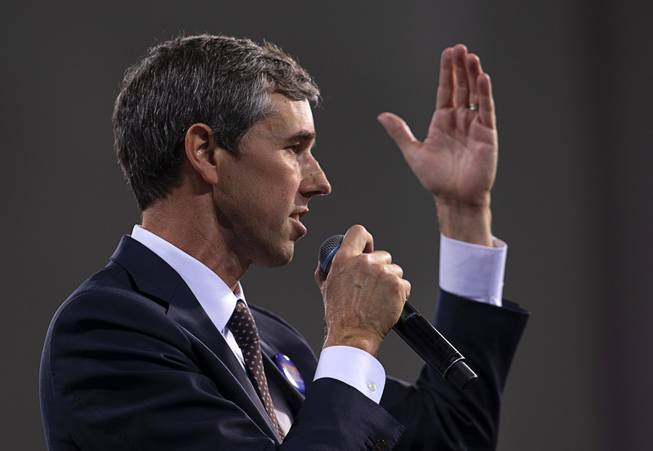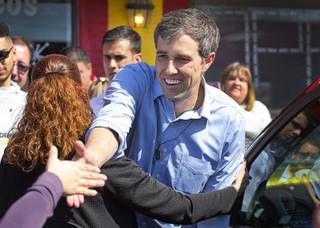
Democratic presidential candidate Beto O’Rourke, a former Texas congressman, speaks at the National Forum on Wages and Working People in Las Vegas Saturday, April 27, 2019.
Tuesday, May 7, 2019 | 2 a.m.
Democratic presidential hopeful Beto O’Rourke has spent the majority of his life in his hometown of El Paso, Texas. But on a recent trip to Las Vegas, the one-time congressman showed he’s well versed in issues of importance in Nevada.
O’Rourke, who was propelled into the national spotlight in 2018 when he nearly pulled off an upset in his campaign for the U.S. Senate against incumbent Texas Republican Ted Cruz, sat down last month with the Sun to talk about issues facing the United States and Nevada, including climate change, Yucca Mountain and the growing legalization of recreational marijuana across the country in contradiction of federal law.
Marijuana reform was one of the first issues O’Rourke tackled in his presidential campaign, which he launched March 14 in Burlington, Iowa. Legalization nationwide, he said, is one of the best ways to combat minors’ use of marijuana by cutting off the black market and introducing regulation.
“I would argue that ending the prohibition would give us a better chance from keeping kids from being able to purchase it due to the black market,” he said. “(Illegal) dealers don’t ID.”
He said he would allow marijuana businesses to access the federal banking system. Currently, in states that have legalized marijuana, owners of businesses in the industry are typically forced to do all of their business — including paying taxes — in cash due to the federal Schedule I status of the drug. That mean banks could be charged with money laundering if they were to open accounts for marijuana-related businesses.
Efforts in Nevada to open the state banking system to marijuana-based businesses failed to pass a legislative deadline earlier this year, but efforts are underway in Congress to allow the businesses to do banking as any legal business is now able to do.
O’Rourke also said he would expunge the records of anyone convicted of possession of marijuana — a number that reached around 600,000 people in 2017 by some estimates.
O’Rourke said he would not seek funding for the Yucca Mountain nuclear waste repository, and said he sided with Nevada in opposing the shipment of nuclear waste from other states to Yucca Mountain, which is about 90 miles northwest of Las Vegas.
“I support this state’s position. I support your U.S. senators’ positions,” he said.
His record in Congress, he said, reflected his position.
“I have voted consistently with Nevada, and really with the country’s interests and with Texas’ interests, in ensuring that nuclear waste is not transported to Yucca Mountain,” he said.
O’Rourke, who said he spoke with Nevada’s former U.S. Sen. Harry Reid about the possibility of storing nuclear waste near the site of its production.
“I think that there’s a way not only to continue to protect Nevada (and) the other states through which that waste would pass, but also to store it in a safe, secure way near where it is generated or produced.”
O’Rourke recently released his climate change plan, which calls for $5 trillion in investment in infrastructure and sustainability efforts and reduces greenhouse gas emissions to net zero by 2050.
The candidate said Nevada’s water mitigation plans and environmental actions have placed the state in an important position for influencing environmental actions.
“I think that there’s a lot that the country can learn from Nevada and specifically the southern part of the state, in terms of conversation and responsible water use” he said.
Specifically, he touted water recycling plans in place in Nevada, which he said could give guidance to other places in the Southwest U.S. that may be suffering water shortages. Southern Nevada currently reclaims the vast majority of all of its wastewater.
“I’m in your same situation in El Paso, Texas,” he said. “We depend on the Rio Grande river. We have disputes with New Mexico in a compact to share the water out of the Rio Grande River Basin and with Mexico — so kind of the same dynamics you face here in Nevada.”
O’Rourke touted the Southwestern United States’ movement on renewable energy — in both job creation and in the fight against climate change.
“We are going to continue to cook this planet unless we change course and take a bold change in course over the next 10 years,” he said. “And I think there’s a really unique role for the communities of the Southwest to lead in that change.”
In his quest for the Democratic presidential nomination, O’Rourke has positioned himself somewhere between progressives like Elizabeth Warren and died-in-the-wool centrists like Joe Biden.
The field’s rapid expansion — it now numbers above 20 Democratic hopefuls — doesn’t seem to faze O’Rourke.
“I feel good. I think the country should feel good,” he said. “It’s a good sign of vitality for our democracy, and the ability for our party to produce a field of candidates that looks like America.”

